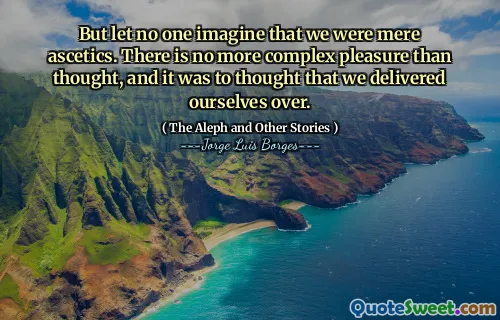Jorge Luis Borges was an influential Argentine writer, poet, and essayist born in 1899. His work is celebrated for its complex themes and innovative narrative styles that challenge conventional storytelling. Borges often explored philosophical concepts such as infinity, reality, and the nature of time, frequently blurring the lines between fiction and reality. His use of metafiction and intertextuality invites readers to engage deeply with his texts, making them integral to the broader literary canon. Borges' prominent works include "Ficciones" and "El Aleph," collections of short stories that showcase his unique ability to intertwine the impossible with the mundane. These narratives often feature labyrinths, mirrors, and philosophical puzzles, reflecting his fascination with the infinite and the unknown. His writing style is distinctive, marked by precise language and a love for paradoxes, which contributes to the complexity and richness of his narratives. Despite his fame, Borges faced challenges in his literary career, particularly due to his blindness later in life. Nevertheless, his influence grew, and he became a key figure in Latin American literature. Borges received several prestigious awards and honors, leaving a lasting legacy that continues to inspire writers and thinkers worldwide.
Jorge Luis Borges was a groundbreaking figure in literature, known for his intricate narratives and deep philosophical explorations. His unique perspective reshaped the understanding of fiction and its relationship to reality.
Born in Argentina, Borges' work often features themes of infinity and labyrinths, utilizing a blend of fantasy and realism that captivates readers. His storytelling is characterized by sharp prose and innovative techniques.
Despite personal challenges, including losing his sight, Borges achieved significant acclaim during his lifetime. His contributions to literature have established him as one of the most important writers of the 20th century.
More »
Today Birthdays
1970 -
Shonda Rhimes
1599 -
Edmund Spenser
1940 -
Edmund White
1957 -
Lorrie Moore
1691 -
George Fox
1961 -
Wayne Coyne
1934 -
Carolyn See
1965 -
Bill Bailey
1967 -
Masha Gessen
1937 -
George Reisman
1890 -
Elmer Davis
1978 -
Nate Silver
1884 -
Sophie Tucker
1960 -
Matthew Bourne
1980 -
Maria de Villota
1977 -
Orlando Bloom
1976 -
Michael Pena
1952 -
Geoffrey Canada
1951 -
Frank Peretti
1955 -
Trevor Rabin
1808 -
Salmon P. Chase
1947 -
Robert Martin
1927 -
Sydney Brenner
1926 -
Carolyn Gold Heilbrun
1954 -
Denise Morrison
1960 -
Eric Betzig
1968 -
Traci Bingham
1919 -
Robert Stack
1970 -
Keith Coogan
1989 -
Beau Mirchoff


